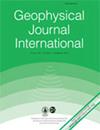A multiscale magma system beneath the Tengchong volcano in western Yunnan revealed by ambient noise tomography
IF 2.8
3区 地球科学
Q2 GEOCHEMISTRY & GEOPHYSICS
引用次数: 0
Abstract
Summary The western Yunnan is located in the SE Tibetan Plateau, and is characterized by the active Tengchong volcano (TCV), complex crust-mantle coupling and intense earthquakes. To elucidate tectonism in the western Yunnan, we construct a 3D S-wave velocity model to 80 km depth via ambient noise tomography using dense seismic stations. Our model shows significant low-velocity anomalies at different depths in the crust and uppermost mantle. Compared with the results of previous regional tomography, we image low-velocity anomalies consistent with a large-scale source of partial melts in the uppermost mantle beneath the Tengchong and Baoshan blocks, rather than just below the Tengchong block. Our results also reveal a magma chamber extending from the shallow subsurface to the lower crust beneath the TCV, which is fed by the mantle source. Based on these findings, we propose that the mantle source and crustal magma chamber form a multi-scale magma system. Moreover, the mantle source is potentially resulted from asthenospheric upwelling, which is related to the subduction of the Indian slab. In addition, our model shows that the 1976 M7.4 and M7.3 Longling earthquakes occurred near a magma chamber. Thus, fluids from the magma chamber likely reduced the frictional coefficient on the seismogenic fault and caused the Longling earthquakes.环境噪声断层扫描揭示的滇西腾冲火山地下多尺度岩浆系统
摘要 云南西部位于青藏高原东南部,以腾冲活火山(TCV)、复杂的地壳-地幔耦合和强烈地震为特征。为了阐明云南西部的构造运动,我们利用密集的地震台站,通过环境噪声层析技术,构建了一个深度达80千米的三维S波速度模型。我们的模型在地壳和上地幔的不同深度显示了明显的低速异常。与之前的区域层析成像结果相比,我们的低速异常图像与腾冲和保山地块下的最上层地幔中的大规模部分熔融源一致,而不仅仅是腾冲地块下。我们的研究结果还揭示了一个从浅表次表层延伸至腾冲地块下地壳的岩浆腔,该岩浆腔由地幔源提供能量。基于这些发现,我们提出地幔源和地壳岩浆室构成了一个多尺度岩浆系统。此外,地幔源可能来自与印度板块俯冲有关的星体层上升流。此外,我们的模型显示 1976 年 M7.4 和 M7.3 级龙陵地震发生在岩浆腔附近。因此,岩浆室的流体很可能降低了地震断层的摩擦系数,从而引发了龙陵地震。
本文章由计算机程序翻译,如有差异,请以英文原文为准。
求助全文
约1分钟内获得全文
求助全文
来源期刊

Geophysical Journal International
地学-地球化学与地球物理
CiteScore
5.40
自引率
10.70%
发文量
436
审稿时长
3.3 months
期刊介绍:
Geophysical Journal International publishes top quality research papers, express letters, invited review papers and book reviews on all aspects of theoretical, computational, applied and observational geophysics.
 求助内容:
求助内容: 应助结果提醒方式:
应助结果提醒方式:


